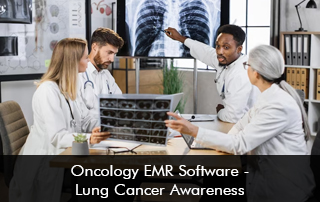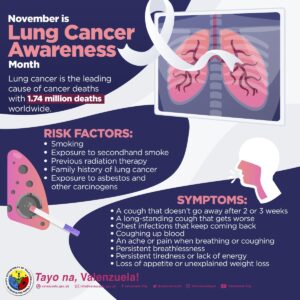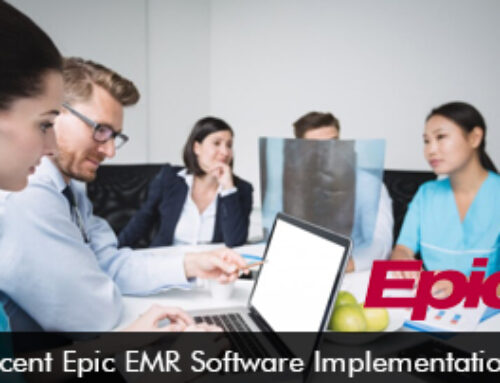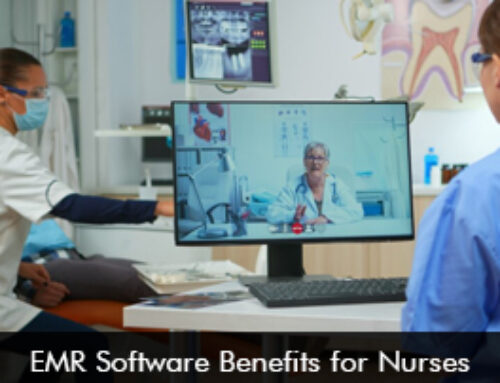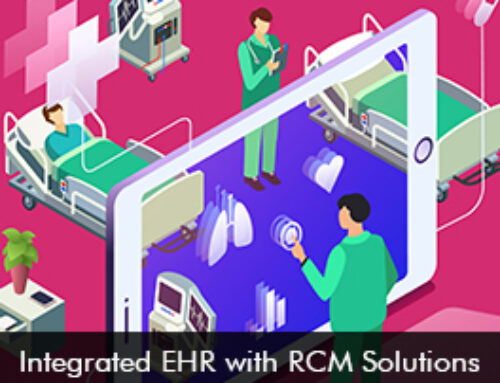Lung cancer poses significant challenges in oncology due to its high incidence and mortality rates. Oncology Electronic Medical Record (EMR) software contributes to lung cancer awareness campaigns, early detection initiatives, and patient education. EMR software also assists in the overall improvement of healthcare outcomes in the battle against this insidious disease.
Lung Cancer Awareness: A Call to Action
Lung cancer awareness campaigns aim to educate the public about the risk factors associated with this disease, promote early detection through screenings, and foster a better understanding of available treatment options. Oncology EMR software plays a pivotal role in amplifying the impact of these awareness initiatives.
Early Detection Initiatives
Early detection is a linchpin in the fight against lung cancer, and Oncology EMR software serves as a catalyst for initiatives geared toward identifying potential cases in their early stages.
Automated Screening Reminders
EMR systems can be programmed to generate automated reminders for patients who fall into high-risk categories, encouraging them to undergo regular screenings such as low-dose CT scans. This proactive approach aids in catching lung cancer at its nascent stages when it is more treatable.
Leveraging the capabilities of Oncology EMR software, healthcare providers can conduct population health analyses to identify geographical areas with higher incidences of lung cancer. This information is invaluable for tailoring targeted awareness campaigns and screening programs to at-risk communities.
Lung Cancer Patient Education and Engagement
Effective awareness campaigns rely on informed and engaged communities. Oncology EMR software facilitates patient education and engagement through various channels.
EMR systems include patient portals that empower individuals to access information about lung cancer, its risk factors, and the importance of early detection. Educational resources, personalized health information, and details about upcoming awareness events can be readily available through these portals.
Telehealth and Virtual Education
With the rise of telehealth services integrated into EMR systems, healthcare providers can conduct virtual educational sessions about lung cancer awareness. Patients can participate from the comfort of their homes, fostering a broader reach for awareness initiatives.
Streamlined Communication and Coordination
Oncology EMR software streamlines communication and coordination among healthcare providers, ensuring everyone involved in a patient’s care is on the same page.
Multidisciplinary Collaboration
Lung cancer treatment often involves a multidisciplinary approach, with oncologists, radiologists, surgeons, and other specialists collaborating. EMR systems facilitate seamless communication, enabling specialists to share insights, coordinate treatment plans, and contribute to lung cancer awareness efforts.
EMR systems automate follow-up procedures, ensuring that patients receive timely reminders for screenings, follow-up appointments, and educational events related to lung cancer awareness.
Precision Medicine and Personalized Treatment for Lung Cancer
The advent of precision medicine has transformed cancer treatment, and Oncology EMR software plays a crucial role in tailoring treatments to the individual characteristics of each patient.
Genomic Profiling
EMR systems can store and analyze genomic data, allowing healthcare providers to identify specific genetic mutations associated with lung cancer. This information contributes to personalized treatment plans and supports awareness campaigns emphasizing the importance of genomic testing for targeted therapies.
Oncology EMR software provides treatment decision support by integrating the latest research findings and clinical guidelines. This assists healthcare providers in making informed decisions and ensures that patients are aware of the most cutting-edge treatment options available.
Challenges and Considerations
While the integration of Oncology EMR software into lung cancer awareness initiatives brings significant benefits, there are challenges that must be addressed:
Access Disparities
Not all communities have equal access to technology or healthcare resources. Efforts must be made to bridge these gaps and ensure that the benefits of Oncology EMR software reach all segments of the population.
Patient engagement through portals and virtual platforms requires a level of digital literacy. It is essential to provide support and education to individuals who may not be familiar with using these technologies.
Data Security
As with any digital platform, ensuring the security and privacy of patient data is paramount. Stricter regulations and robust security measures must be in place to safeguard sensitive health information.
Seamless communication among different EMR systems is an ongoing challenge in the healthcare industry. Standardization and interoperability efforts are essential to maximize the impact of Oncology EMR software.


